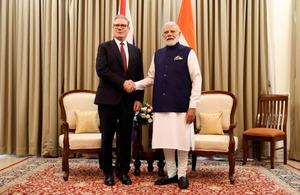India and UK Collaborate on £350 Million Missile Deal
 New Delhi
New DelhiIndia and the United Kingdom Strengthen Defence Ties with £350 Million Missile Deal and Naval Collaboration.
At the invitation of India’s Hon’ble Prime Minister Shri Narendra Modi, the Prime Minister of the United Kingdom, Rt Hon Sir Keir Starmer MP, paid an official visit to India accompanied by a high-level delegation. The British delegation included Secretary of State for Business and Trade and President of the Board of Trade Rt Hon Peter Kyle MP, Secretary of State for Scotland Rt Hon Douglas Alexander MP, Minister for Investment Mr. Jason Stockwood, and over 125 CEOs, entrepreneurs, university Vice Chancellors, and cultural leaders.
During the visit, India and the United Kingdom signed a landmark £350 million defence contract for the procurement of Lightweight Multirole Missiles (LMM) manufactured by Thales UK. These air-defence missiles and launchers, built in Belfast, Northern Ireland.
The LMM, also known as Martlet, is a lightweight precision missile weighing 13 kilograms, capable of engaging both air and surface targets. It has an operational range of over 6 kilometres and travels at 1.5 times the speed of sound, providing a versatile and highly mobile defence solution. These Laser-Guided Drone Busters played a major role in successfully defending Russian Drone attacks by Ukrain.
UK Defence Secretary John Healey stated that the agreement reflects the growing defence collaboration between India and the UK. “These deals show how our expanding strategic partnership with India will boost UK business, jobs, and innovation. This is a key step toward a long-term industrial partnership in defence technology and advanced propulsion systems,” he said.
Alongside the missile contract, both nations signed an implementing arrangement worth £250 million to advance joint development of electric propulsion systems for naval ships. This collaboration aligns with India’s ‘Make in India’ initiative and the UK’s Strategic Defence Review, marking a significant stride in sustainable maritime defence innovation.
Prime Minister Keir Starmer highlighted that these agreements are tangible evidence of a strengthening strategic and industrial relationship between the two countries. His visit coincided with Exercise Konkan, a major joint naval exercise where the Royal Navy’s Carrier Strike Group, led by HMS Prince of Wales, operated alongside the Indian Navy’s INS Vikrant in the Western Indian Ocean—symbolizing deepening operational cooperation between the two maritime powers.
The UK has been seeking to expand its share in India’s defence market, which one of the world’s largest. Despite accounting for just over 3% of India’s defence imports over the past decade, London aims to broaden its footprint through government-to-government partnerships, co-development projects, and industrial collaboration. India, meanwhile, continues to diversify away from Russian-origin weaponry, increasingly turning to trusted Western partners such as France, the United States, Israel, and now the United Kingdom.
This milestone deal, coupled with ongoing negotiations on complex weapons and naval systems, represents a major step toward a modernized, technology-driven India–UK defence partnership. It demonstrates mutual commitment to security, industrial growth, and innovation — paving the way for greater interoperability and co-development of next-generation military technologies.
Related news :
CLASSIFIEDS
Reach out to the Aerospace and Defence Industries/Professionals
